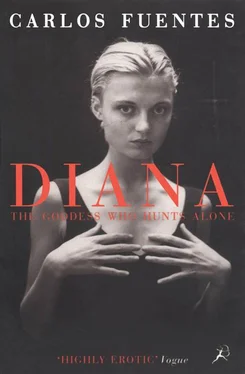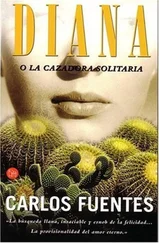Carlos Fuentes - Diana the Goddess Who Hunts Alone
Здесь есть возможность читать онлайн «Carlos Fuentes - Diana the Goddess Who Hunts Alone» весь текст электронной книги совершенно бесплатно (целиком полную версию без сокращений). В некоторых случаях можно слушать аудио, скачать через торрент в формате fb2 и присутствует краткое содержание. Год выпуска: 2012, Издательство: Bloomsbury UK, Жанр: Современная проза, на английском языке. Описание произведения, (предисловие) а так же отзывы посетителей доступны на портале библиотеки ЛибКат.
- Название:Diana the Goddess Who Hunts Alone
- Автор:
- Издательство:Bloomsbury UK
- Жанр:
- Год:2012
- ISBN:нет данных
- Рейтинг книги:3 / 5. Голосов: 1
-
Избранное:Добавить в избранное
- Отзывы:
-
Ваша оценка:
- 60
- 1
- 2
- 3
- 4
- 5
Diana the Goddess Who Hunts Alone: краткое содержание, описание и аннотация
Предлагаем к чтению аннотацию, описание, краткое содержание или предисловие (зависит от того, что написал сам автор книги «Diana the Goddess Who Hunts Alone»). Если вы не нашли необходимую информацию о книге — напишите в комментариях, мы постараемся отыскать её.
Diana the Goddess Who Hunts Alone — читать онлайн бесплатно полную книгу (весь текст) целиком
Ниже представлен текст книги, разбитый по страницам. Система сохранения места последней прочитанной страницы, позволяет с удобством читать онлайн бесплатно книгу «Diana the Goddess Who Hunts Alone», без необходимости каждый раз заново искать на чём Вы остановились. Поставьте закладку, и сможете в любой момент перейти на страницу, на которой закончили чтение.
Интервал:
Закладка:
Clean, direct, savage, refined, Posada brought a message. A lady dressed in black with a train to her skirt, revolver in hand, had just murdered another lady, also dressed in black with a train to her skirt and also with a pistol in her hand. Obviously, the first lady had gotten the drop on the second. But the murderess had turned her back on an open balcony and to the light of the sun, as if the promise of her crime were, despite everything, life. The murdered woman, on the other hand, was imprisoned by a serpent whose coils were suffocating her, making the viewer doubt whether in fact she’d been murdered by her presumptive rival or whether Posada was depicting — as he did in other pictures, with a serpent wrapped tightly around a woman’s body, braiding her — an epileptic.
In any case, behind her opened the jaws of a devouring toothy monster that in fact was the entrance to a circus. Flying out of that open mouth were bats and demons, souls in torment, succubi and incubi: a whole carnival of malignant dreams, a nightmare that transformed the murder of an elegant woman dressed in black into one that would be its double, a Mardi Gras of sickness, death, laughter, gambling, news, all mixed together …
The little man with the golden chain asked so little money that I was about to give him twice as much, as a gift. I didn’t, because he would have taken offense. I waited until after dinner to give my present to Diana. But she was tired that night and fell asleep early. I read for a while and then followed her. Tomorrow I’d give her the present. Then I woke up with a shock, and she was sitting next to me, trembling.
“Diana, what’s the matter?”
“I was dreaming.”
I looked at her in silence. She told me this: A woman dressed in black shot her to death. Diana, also dressed in black, was falling, mortally wounded, though the instantaneous death was accompanied by convulsions.
“What else?”
“That’s all.”
“Wasn’t there a snake wrapped around you?”
“What are you talking about? The most important thing, I want you to know, was the sky, a little piece of sky that you could see through the window.”
“The murderess had her back to the open balcony.”
“How do you know?”
Diana’s dream upset me so much that I made the mistake of going too far, of asking her if there was also, behind her, a horrible mouth filled with vampires.
“No. Not even that snake around me. You can skip the Freud for Beginners, okay? I told you I don’t want a biographical chicken with Freudian dressing. I told you that before. When you hear someone say ’poor country girl devoured by instant success,’ don’t believe it. Don’t believe the story of the innocent girl abused by the tyrannical Teutonic director. Only believe in the images of me that you take away from our relationship.”
“You yourself give me so many, I don’t have to invent anything.”
“Then don’t believe anything about me.”
XXI
I decided not to play along with her irrational manias — the bathroom door always closed, the window curtains always open in expectation of moonlight pouring in on a snowy landscape. Her accusation annoyed me: “You have no imagination.” Actually, what I wanted was for us to share the imagination of the future instead of that morbid imagination of a past in which I didn’t figure. There was pride in that, but also fear, fear that Diana’s memory would enslave me and that we would both lose in a morbid reconstruction of irrecoverable moments.
It seemed strange to me to be in such a position, a Mexican supposedly loaded down with too much past, she a mid-western gringa supposedly devoid of memory. Was that why she wanted to invent for herself a treasure chest of memories, a true mnemonic treasure, inviting me to re-create it with her? No doubt about it. But at that moment I was living through a crisis of power with regard to women, a crisis precipitated by vanity and caprice. It excluded the vanity and caprice of women, eliminated them and occasionally eliminated the women, too, if they didn’t obey my desire for them to eliminate their own caprices.
Once I went to Taxco with a rich Mexican girl who complained about the hotel room. It seemed too low-class to her. I told her she was an intolerable rich brat, incapable of adapting to circumstances and devoid of fantasy or the spirit of adventure, but what I was really saying was: Just count yourself lucky that I actually brought you along for the weekend. I decided no Mexican woman was going to gain power over me through whim, vanity, pride. I’d always be one step ahead of them; I’d give them a dose of their own medicine. They’d hurt me too much when I was young. They were weak, vain, easy to convince when their parents crossed me off the eligible-bachelor list just because I had no money and my rivals did. Now that they were after me, I paid them back in kind, knowing all along that I was hurting myself more than I was hurting them. By denying Diana that share of her imagination which she demanded, I was letting myself be swept along by the inertia of my previous loves. She was no spoiled Mexican brat, and I was committing a serious error with an exceptional woman.
I quickly tried to make up for it, letting her know that I would bow to her desire to close the bathroom door and to imagine a snowy moonlit night. She was puzzled by my attitude, annoyed sometimes. She begged me to close the door. But she berated me scornfully for not helping her recover her lost imagination. That confirmed for me a basic Hispano-Arab conviction: in the harem it is not the eunuch who rules but the sultan. Diana would become terribly weak and sweet when she begged me please to leave the bathroom door closed, and I would feel guilty for not acceding to her wish. Perhaps I saw in her pleas something that always annoyed the hell out of me: someone giving me orders, especially orders about order.
I always had a good relationship with my father, a very good relationship, except on that one point. I loved to infuriate him with my disorder. He was the son of a German woman and was proud of his punctuality, his refined devotion to order. His closets, his papers, and his schedule were all examples of a well-ordered life. I piled papers on my desk, left my dirty shirts on the floor, and one day, right before his eyes, I put on my shoes and then tugged and pulled my trousers over them. The spectacle horrified and disgusted him. But it also aroused a tenderness in him I would never have expected. He saw my weakness. He accepted it. He forgave me. He never again gave me an order, and I never again took one from anybody. I organized my life around my work so as to be independent or, in any case, to choose my dependencies with a certain freedom. And my physical disorder became a motive for mental order. In the chaos of my work papers, books, and letters, I always know — and only I know — where things are. As if I had radar in my head, my hand shoots directly to the Leaning Tower of Paper and instantly finds exactly what it seeks. Sometimes the tower collapses, but the object is never lost.
Emotions, unlike papers, refuse to be catalogued in order or disorder. They challenge us to find their form — only to disappear like the perfume of certain flowers that seems to be the most fixed, the most real thing in the world and yet has no more form than the rose or iris from which it emanates. We know, of course, that the form of the rose is not its scent, but in effect, its scent is a phantom similar to emotions, which are the realest but least apprehensible things in the world. I punished myself mentally for my mistakes in dealing with a woman like Diana Soren, allowing myself to slide on the little sled of my domestic loves. I convinced myself that she was giving me passion and tenderness, and I was too lucky not to realize the privilege it was to love her, even if that meant giving in, if necessary, to her whims and imaginings.
Читать дальшеИнтервал:
Закладка:
Похожие книги на «Diana the Goddess Who Hunts Alone»
Представляем Вашему вниманию похожие книги на «Diana the Goddess Who Hunts Alone» списком для выбора. Мы отобрали схожую по названию и смыслу литературу в надежде предоставить читателям больше вариантов отыскать новые, интересные, ещё непрочитанные произведения.
Обсуждение, отзывы о книге «Diana the Goddess Who Hunts Alone» и просто собственные мнения читателей. Оставьте ваши комментарии, напишите, что Вы думаете о произведении, его смысле или главных героях. Укажите что конкретно понравилось, а что нет, и почему Вы так считаете.












